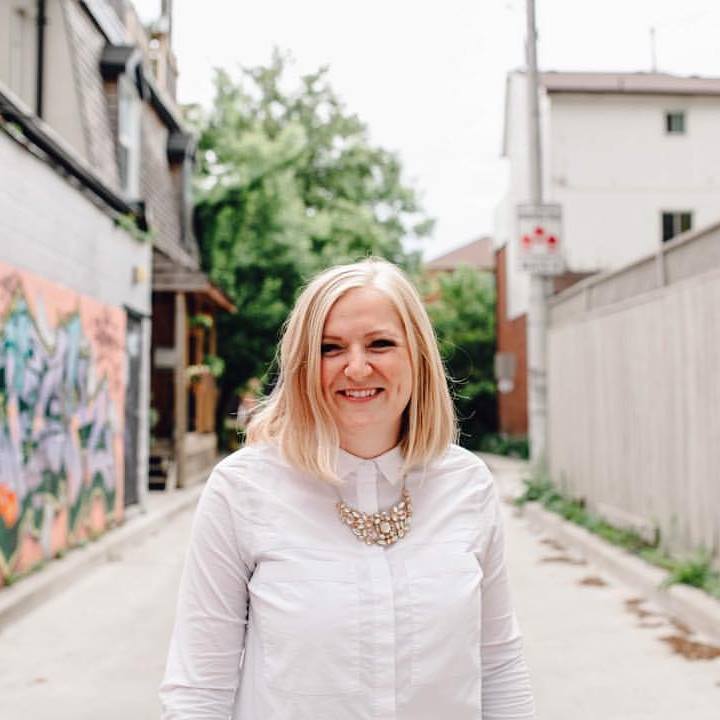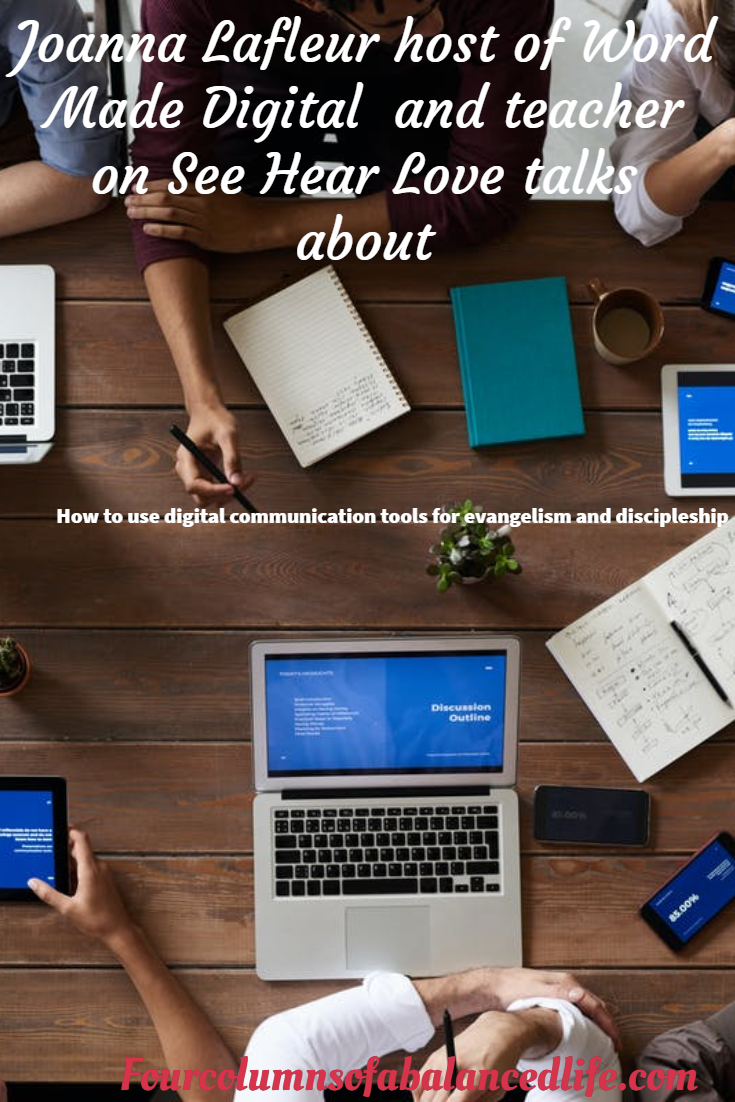Joanna Lafleur: 21st century’s Aimee McPherson

Joanna Lafleur has an undergrad in communication and business and a master’s in theological studies focusing on how to use digital communication tools for evangelism and discipleship. Over the last 15 years, she has spoken at churches, conferences, camps, and ministries in North America, Europe, and Asia. She also led the creative communication team at Sanctus, a multi-site church in Ajax. Joanne Lafleur also hosts a podcast for Creatives and Communicators called Word Made Digital and teaches the Bible on a nationally televised Christian talk show called “See Hear Love”, now in its 4th season. She is a proud aunt to 12 nieces and nephews, a board member with InterServe, a songwriter with C4 Worship, and an advisor to the Institute of Evangelism at Wycliffe College.

Joanne help me understand your role as a director of communications in a church setting?
I typically try to explain it by saying that I get to oversee everything you see and touch in our church at a church-wide level. What I mean by that is signage, images on screens, videos, banners, graphics, branding, printed promotional cards, magazines, interactive elements within a service like booklets or stickers, church-wide emails, social media, photography, etc. By no means do I do all this myself! We have a great team of staff, volunteers, and contractors that work together to get this done week in and week out. Generally, all this is being done under my conviction that the Church has the most important message in the world, so I’m trying to help us be the best communicators we can be of that message, in our ever-changing, highly digital culture.
Talk to me about your TV show, blog, and your podcast. What is the ultimate goal of these shows?
In general, wherever I’m communicating and over whatever medium, my prayer is that I actually help real people. On the TV show, my desire is to communicate the Bible and who Jesus is in a joyful, practical, and accessible way that might encourage viewers who are going through all kinds of struggles of their own and need the hope of Christ. In my writing, I’m trying to provide practical help for real communications problems that people working in churches wrestle through every day, often with much less resource than we have in a larger church. On the podcast, I’m trying to help creatives and communicators see their work differently while getting an inside look at some of the voices in the field that inspire them.
You are also a pastor in a role held by men since the beginning of time. Explain the highs, lows and the challenges of being taken seriously?
That’s a big question! We could spend a long time talking about this, so I want to, first of all, recognize that it’s a big topic, and full of lots of emotions and opinions for people. That said, generally, I don’t want to make gender a big thing in the spheres where I lead. I don’t label myself as a “woman leader” when I walk into a room. I am simply, a leader. I’m not sure I’ve ever had an issue with being “taken seriously”, because I try to walk in the confidence of my calling.
Whether man or woman, you are taken seriously by leading well. Getting an education. Backing up the talk with action. Increasing your emotional intelligence. Loving the people, you serve. Becoming better at what you do by being teachable. Living with integrity publicly and privately. That brings lots of challenges, but I’m not sure they are uniquely female.
I would say the particularly female challenge for many, and it was for me, was coming to terms theologically with what I understood was the calling of God on my life to lead. It wasn’t just should I go in this direction, but actually, is this in obedience and alignment with scripture? I don’t think men ask that question when stepping into leadership, and for me growing up with very few models of women in leadership, it was a wrestle initially to come to understand the amazing opportunities there are for women to lead or pastor. Now, I hope the generation coming up after me has many amazing examples of men and women to follow after as mentors and models of leadership.
You are like me, you grew up in a couple of different countries and like to travel. What has all those experiences taught you as a person?
The biggest thing for me, beyond a desperate desire to travel every month, is that there are lots of ways to do things, and just because something is different doesn’t make it wrong. There are many ways to get to a similar goal: making a meal, raising children, leading a country, worshipping Jesus… all can have a few approaches with pros and cons to them, and we are more the same than we are different as humanity. I hope it’s made me be a more open-minded person to new ideas, people, and foods.
In life, we all go through challenges. Give me an example of something you have been through and how you are dealing with it?
A current challenge I’m going through is learning to grieve well. I’ve experienced a lot of deaths in my family in the past year, and my father who has Parkinson’s and dementia has really taken a turn for the worse in 2019. It’s a strange thing to grieve someone who is still alive, yet each month we lose more and more of who we knew him to be, so it is prolonged grief. I’m learning that I’m stronger than I thought I was. I’m learning to be gentle to myself. I’m learning what it looks like to serve someone who once served me. I’m drinking lots of coffee, praying lots for endurance, and trying to keep a great sense of humour about it all.
As a Millennial what are some of the challenges your generation is facing?
The biggest one that comes to mind, is that a lot of experts talk about this as a “fatherless” generation. A lot of the struggles for identity, purpose, career and education pursuits, financial stability, and more seem to stem from so many people lacking a solid father figure to guide them and love them in a consistent way. This is not my own personal story, but absent or just unavailable dads is a major marker of this generation. It leaves an amazing opportunity in the church for men to rise up and disciple a few younger people around them, caring for them with the love and wisdom of a father.
I have known you for a decade. Any advice you would give to your younger self?
I’d probably tell her to treat everyone with more kindness than she thinks they deserve, including kindness towards herself. And to buy as much Toronto real estate as possible before the prices went nuts 🙂
Rapid Fire questions
Favorite restaurant in TO
Depends on the occasion, but I love “La Carnita” on John St for out of this world tacos. And a little Italian place in Leslieville called “Frankie’s” that changes its fresh pasta menu every week.
Favorite café
Boxcar Social. Best coffee in the city (IMO).
Steak with which wine
Steak- medium-rare. Wine- I’m not an expert. When out, I usually just do the house red or a Cabernet Sauvignon.
Favorite beer
Jelly King, from Bellwoods Brewery. It’s a local sour beer from Toronto.
Favorite author
C.S. Lewis. A brilliant mind, and a life-long influence on my understanding of God. From a childhood in Narnia, to adolescence in his apologetics, to a seminary student taking a course on his evangelism style, to an adult finding comfort in a Grief Observed.
Favorite city
Toronto! And then: Marseille France, Amsterdam Netherlands, San Diego USA, Istanbul Turkey.
Name of one famous you want to have a meal with?
Famous people don’t appeal to me much. I’d rather have dinner with current friends or my grandparents who died before I met them.


1 thought on “Joanna Lafleur: 21st century’s Aimee McPherson”